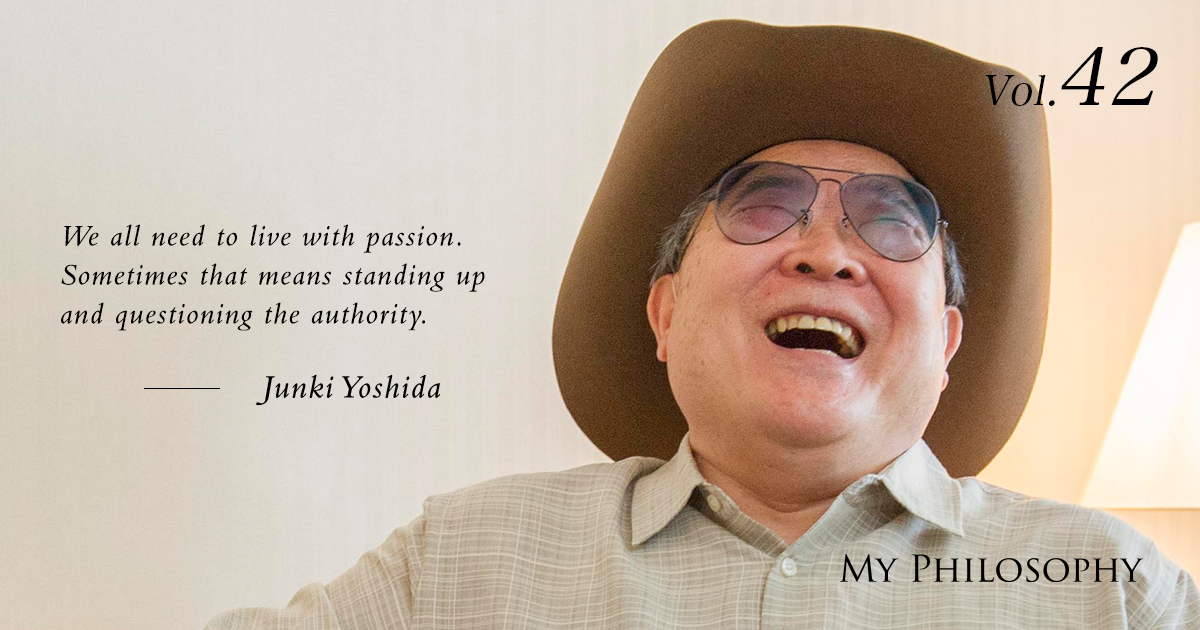
Entrepreneur and sauce magnate Junki Yoshida is proof that the American dream is still alive and well after heading up several successful businesses in his adoptive home of the United States. He shares his views on contemporary Japan from an American perspective in this interview, a dream ten years in the making for Daisuke Sugiyama, My Philosophy’s editor-in-chief.
Profile
Vol.42 Junki Yoshida
Chairman and CEO, Yoshida Group & Founder, Yoshida Sauce
Born 1949 in Kyoto, Junki Yoshida first traveled to the United States on his own in 1969. After surviving a turbulent start to American life, he created Yoshida’s Gourmet Sauce using a secret homemade recipe, whose production and sales would earn him an incredible story of a real-life American dream. Yoshida was inducted into the Hall of Fame among small to mid-sized business peers such as FedEx, Intel, AOL, and Hewlett Packard on the eve of the Small Business Administration’s 50th Golden Anniversary. In 2005, the Japanese edition of Newsweek named him one of one hundred most respected Japanese people around the world. Yoshida has also been awarded the Foreign Affairs Minister’s Prize for his many contributions to the enduring friendship between Japan and the State of Oregon. In addition to serving as chairman of the Yoshida Group, the holding company of 18 corporations, Yoshida travels the world constantly, making regular appearances on local cooking shows, giving guest lectures, and appearing on a variety of Japanese TV shows.
Yoshida is the author of Stick Out to Stand Out in Life and Business (Jinsei mo shobai mo, deru kui utarete nanbo yade.) (Gentosha) and Taste of Successful Business: Seven Business Principles by the Founder of Yoshida Gourmet Sauce (Discover 21, Inc).
Money makes you wealthy, but friends make you rich

I think I’ve amassed a wealth of relationships in my life so far. If I had only thought of making money, my businesses surely would not have succeeded. True personal wealth lies in connecting with people. When you focus on relationships, money naturally comes along. In the United States, there’s a place called Fred Meyer, a one- stop shopping center where you can buy anything you need. The year after I started my company, I participated in a 200-person charity golf tournament. Someone took pity on me and paired me with the then-president of Fred Meyer. We shared a couple beers just after the tournament started and were both feeling tipsy by the sixth hole. We had a great time chatting during the tournament and at the barbeque afterwards, all without mentioning a single thing about business. Two weeks later, I got a call from their buyer: “We’ve gotten word from management to stock all 160 of our stores with your sauce.” I was genuinely shocked. This is exactly what I mean by focusing on relationships. I truly doubt that my sauce would have been sold at every Fred Meyer in the country had I tried to pitch it on the green.
I had a similar experience in Japan.The president of a large chain of supermarkets asked me to come see him. I went and we chatted for well over an hour, making small talk and cracking jokes. As I was about to leave he asked,“Does anywhere in Japan carry your sauce?”
When I answered that Nagasaki-ya did, he blurted out:“We’ll stock your sauce in every one of our stores.” Had I tried to convince him to buy my sauce because of how delicious it tastes, I’m sure that he would have done quite the opposite. I can think of many other examples where focusing on relationships has led to business success. Scheming and conniving to make money is entirely out of the question.
America, the Land of Second Chances

When I speak in Japan, some people who have yet to find dreams of their own are moved to tears after hearing my life story. I believe that it’s Japan’s fault that many of its citizens don’t have dreams. America is different. You always get a second chance. My companies take the form of S-Corporations, so I am personally liable for the taxes of all 18 of them. I’ve been over 1.5 million dollars in debt with a failed snowboard business, but I got half of that money back based on tax laws that returned 50% of my losses from taxes paid over the previous seven years. In America, you can always recover from heavy losses. However, no such support system for failure exists in Japan. High school and college entrance exams are also winner-takes-all, held only once each year. This is in direct conflict with Japan’s policy of yutori education, which is supposed to give children more room to grow.
Almost every successful company in the United States has caused trouble of some sort. Steve Jobs, even with his exceptional talent, was kicked out of his own company. The United States has a climate that allows complete failures to later succeed. In the past I’ve been told by Japanese people that I’d better not talk about all the times that my company was about to go under. Their reason: “You’ll lose trust.” Every time I have been in a financially tight spot, focusing on relationships has helped me get back on my feet. A beautiful success story in America is just not accepted in a country that cannot tolerate failure. I think it’s truly sad that in Japan failure leads to loss of trust.
Competition and Fighting Are Important Lessons in Life

After years in the United States, I’ve become appalled with the quality of Japanese politicians. President Obama is said to have had the most assassination plots of any U.S. president, yet he still puts his life on the line every single day, knowing very well that he may be killed at any moment. This is another difference between Japan and the United States. At the time of the Meiji Restoration, Japanese politicians risked their lives to make their country a better place, and many were attacked and killed by disgruntled citizens. But today politicians don’t risk their lives. And that’s why our country is going mad. Politicians who know nothing about the outside world are telling us to globalize. What really shocks me is that Japanese universities continue to charge tuition for students who are studying abroad. American universities don’t charge tuition for the time students are abroad. Japanese universities, however, tell their young people to go overseas and learn about the world, yet at the same time take their money while they’re away. And what’s worse is that students don’t even question the system. Even in regards to the recent legislation to increase consumption tax, there is no one questioning or criticizing the politics. There are no student movements.
Looking back through history, we see that countries with no student movements have all collapsed. For better or for worse, a country without revolution is not healthy. A country’s youth fight for their lives in revolutions aimed at national reform. I cannot help but think that Japan’s yutori education policy was a mistake.Years ago I was watching CNN with my karate students, and we saw grade schoolers in a race, holding hands and crossing the finish line together. We all laughed saying, “No winners? You’ve got to be kidding me!” “Every day we train to be number one, to be the best we can be. What is Japan teaching its children?” They may not experience being ranked in school, but out in the real world competition does exist. Not everyone can become the president of a company, or even a director or manager. Is a race without winners really a race?
Live Your Passion

I remember the discrimination against children born between Korean women and American soldiers in Korea when I was a child.I cried when I saw aTV show about the orphanages of these children when I was in junior high school. Ever since then, I’ve always wanted to build an orphanage of my own. My property in Portland is almost 1,000 square meters on a plot of land that is more than 80,000 square meters. In the future, I would like to donate all of it and transform it into an orphanage or retreat for children with cancer. My children are all in favor of my decision.When you do business for the community and for other people, you will always be rewarded in one form or another. In Japan, you don’t often see businessmen donate publicly because it could be seen as a publicity stunt.When I tried to give to the hospital where my mother received treatment for four years, they refused my donation. In Japan, hospitals are for-profit corporations, which is in stark contrast to the United States, where hospitals are NPOs that depend on donations for survival. Charity is a natural part of American life.
When my oldest daughter got sick, the hospital told me that I could pay my medical bills whenever I got the money. It was then that I swore to repay this kindness, and this has been a huge motivation in my life. Whenever my company was about to go bankrupt, I would think to myself, “Dammit, just you wait and see.” My point is that you need grit to get by in life.The driving force behind your life must be a passion for a dream that you’re willing to die chasing. And yet I feel like there’s no passion among youth in Japan today.We’ve got to do something about this situation, where the young don’t complain or question authority. Our youth need something worth fighting for.

I was surprised at Sugiyama’s power. His creativity and drive remind me of myself when I was young. His friendly personality and curiosity kept the conversation going, so I may have talked a little too much. He has a childlike innocence about him yet also has impeccable business sense. I think he has the energy to lead, something that many Japanese youth seem to lack. Keep on dreaming! And remember: Money makes you wealthy, but friends make you rich.
Junki Yoshida, Chairman and CEO of Yoshida Group
I first saw Mr. Yoshida on TV in 2006 and have been a fan ever since. I remember being blown away that he was selling his sauce at Costco. On the show he mentioned his “talk less, do more” approach, and that phrase stuck with me, having just started my own business. Recently I checked his website to see when he would be in Japan next, wrote him a fan letter, and now here we are. Talking with him today, I again got the sense that if you want to make something happen, you have to make the first move. He reminded of the importance of building a network of relationships in Japan before taking my business to the United States, a goal I’ve had since college. I even got to try on his signature cowboy hat [laughs]. I feel like I have twice my usual energy after talking to him, and I was able to glean a few new business tips from him as well. Finally meeting Mr. Yoshida has been a dream come true.
This interview took place at the Imperial Hotel, Tokyo, in May 2016. Text by Naomi Kusuda. Photography by Daiki Aizawa.





































































